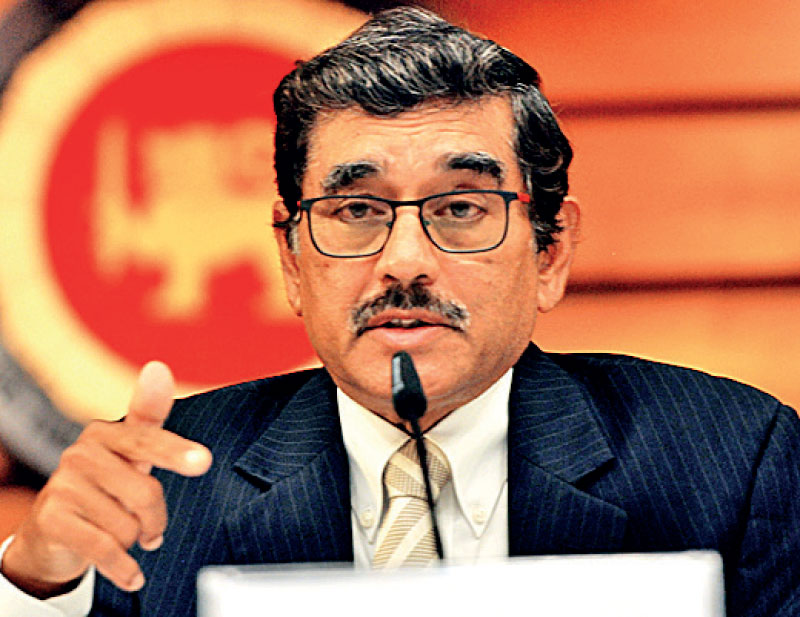Wednesday Feb 25, 2026
Wednesday Feb 25, 2026
Friday, 8 July 2022 05:20 - - {{hitsCtrl.values.hits}}

Central Bank Governor Dr. Nandalal Weerasinghe
By Charumini de Silva
The worsening economic crisis has forced the Central Bank to further tighten the monetary policy, to curtail the soaring inflation to ensure macroeconomic stability.
The Monetary Board at its meeting on Wednesday has decided to increase the Standing Deposit Facility Rate (SDFR) and the Standing Lending Facility Rate (SLFR) of the Central Bank by 100 basis points to 14.50% and 15.50% respectively with immediate effect.
The latest hike comes three months after the tightest stance in April when policy rates were increased by 7%. “The inflation is running over 50% and as per our projections, it might even go close to 70%.”
“From the Central Bank’s point of view, the major concern here is to address inflation and expectations going forward. We hope to bring it down to a reasonable level as soon as possible,” Central Bank Governor Dr. Nandalal Weerasinghe told journalists yesterday.
With the higher-than-expected escalation of headline inflation recently and the increased persistence of high inflation in the period ahead, the Board was of the view that a further monetary policy tightening would be necessary to contain any build-up of adverse inflation expectations.
“In arriving at this decision, the Board weighed the impact of tighter monetary conditions on overall economic activity, including the micro, small, and medium scale businesses, and the financial sector performance, among others, against far-reaching adverse consequences of any escalation of price pressures across all sectors of the economy in the near term.
“On balance, the Board was of the view that this policy adjustment would help guide inflation expectations to be anchored around the targeted level of headline inflation over the medium term while curtailing any build-up of underlying demand pressures in the economy,” the Central Bank said.
The Governor justified the move to further tighten the monetary policy, noting that Sri Lanka was certainly ready to go into a “hyperinflation” situation.
“If we let the inflation go beyond 100%, no one will be able to do their business, while the most vulnerable or the poor will be the most impacted. Even the SMEs will have an adverse impact from high inflation levels. The International Monetary Board (IMF) too recommended introducing safety net programs to support the poor and vulnerable segments to be able to survive high inflation situations,” he explained.
Dr. Weerasinghe however pointed out that given the worsening economic crisis, it was critical to implement not only the monetary policy but also the Government fiscal policy as well as the economic and structural reforms simultaneously.
“The puzzle can only be completed if all macroeconomic imbalances could be addressed in parallel and preferably,” he said.
The Governor claimed that the delay in imposing correct prices for electricity has adversely impacted the Ceylon Petroleum Corporation’s cashflows despite its operating a price formula at present.
“The CPC does not even generate sufficient rupees even after the price hike as per formula and by selling all petroleum products. It does not have sufficient rupees to buy dollars,” he pointed out.
He said the CPC has recently requested Rs. 217 billion from the Treasury which will mean that the Central Bank would have to print money.
“If there is no allocated money, obviously the Treasury will ask the Central Bank to print money,” he said, adding that they did so last week too for an immediate request by the Treasury to print Rs. 18.5 billion. He pointed out that if they did not heed the money printing request the country would have experienced severe economic consequences.
He also claimed that the Ceylon Electricity Board was making losses, but there has been a delay in raising prices.
“Today, we are facing the consequences of not raising prices on time. This is why we need to do the necessary structural reforms on the State-owned enterprises simultaneously with the monetary and fiscal policy decisions,” he said.
The CPC, CEB, and SriLankan Airlines are the three key State enterprises making large losses for years.
As per the Governor’s recommendations, the SOEs are urgently required to bring down the deficit by either increasing the revenues or cutting down on expenditure. However, he said the measures need to be introduced by the Finance Ministry.
Noting that the Central Bank had so far received money printing requests from the CPC, Dr. Weerasinghe hinted there is a possibility that even the other two SOEs might make such appeal in the coming months.
On a positive note, he said the policy adjustments announced in the export and import sector show some development as the trade gap had narrowed slightly.
“The previous import bill which was around $ 2 billion has now come down to $ 1.4 billion and seeing the data we have received so far, it seems like it would come down further to $ 1.3 billion, whilst exports are expected to grow over $ 1 billion this month,” he added.
The Central Bank also said the gross official reserves as of the end of June were provisionally estimated at $ 1.9 billion, including the swap facility from the People’s Bank of China equivalent to around $ 1.5 billion, which is subject to conditions on usability.
Dr. Weerasinghe reiterated that the pace of turnaround with new CBSL measures, IMF support as well as friendly nations China and India, and an end to sufferings of the people depends on implementing the policy and structural reforms simultaneously.
